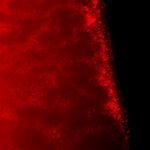Link to Pubmed [PMID] – 15944128
Neuron 2005 May;46(4):595-607
Chronic exposure to nicotine elicits upregulation of high-affinity nicotinic receptors in the smoker’s brain. To address the molecular mechanism of upregulation, we transfected HEK293 cells with human alpha4beta2 receptors and traced the subunits throughout their intracellular biosynthesis, using metabolic labeling and immunoprecipitation techniques. We show that high-mannose glycosylated subunits mature and assemble into pentamers in the endoplasmic reticulum and that only pentameric receptors reach the cell surface following carbohydrate processing. Nicotine is shown to act inside the cell and to increase the amount of beta subunits immunoprecipitated by the conformation-dependent mAb290, indicating that nicotine enhances a critical step in the intracellular maturation of these receptors. This effect, which also takes place at concentrations of nicotine found in the blood of smokers upon expression of alpha4beta2 in SH-SY5Y neuroblastoma cells, may play a crucial role in nicotine addiction and possibly implement a model of neural plasticity.



